Olympic postponement puts some athlete dreams in jeopardy
Inside the lobby of a New York City hotel last September, American fencer Monica Aksamit began to panic.
The front desk clerk had caught Aksamit by surprise when he asked to put a $150 hold on her credit card to cover incidentals.
“That was all the money I had left in my bank account at that time,” the 29-year-old Olympian said. “I texted my best friend and said, ‘Can you please Venmo me some money? Until I get this money back, I don’t even have enough for food or anything.’
Like many elite athletes in niche sports, Aksamit struggles to finance her pursuit of Olympic glory. She estimates that she spends more than $20,000 per year on fencing equipment, domestic and international travel expenses and tournament registration fees.
Aksamit has not been able to snag a major corporate sponsor despite qualifying for the 2016 Olympics and helping the U.S. women capture a bronze medal in the team sabre competition. Her only fencing sponsors pay her in equipment instead of money.
With no other fencing-related income besides a $300 monthly stipend from the U.S. Olympic and Paralympic Committee, Aksamit tries to make ends meet by working part-time jobs that don’t conflict with her training and competition schedules. She referees fencing tournaments, posts sponsored photos to Instagram and picks up part-time modeling gigs.
Embarrassed but out of options when her savings ran dry last fall, Aksamit reluctantly started a GoFundMe page that has since received more than $31,000 in donations. That should have been the end of her money issues. That should have been plenty to fund her aspirations of winning an individual medal this summer. But with the coronavirus forcing the postponement of the Tokyo Games until 2021, Aksamit must somehow scrape together enough money to bankroll her Olympic dreams one more year.
“I don’t know how I’m going to pay for it, but I definitely have to try,” Aksamit said. “I don’t want to quit now and always wonder, ‘What if?’ ”
Athletes may have resoundingly supported the postponement of the Olympics, but the IOC’s decision is the ultimate mixed blessing for many lesser-known names. While they no longer have to worry about jeopardizing themselves, their loved ones and their communities by training in defiance of shelter-in-place guidelines, they now face another year of tight budgets and frantic fundraising.
Whether it's the canoeist who waits tables between training sessions or the pentathlete who joined the military to make ends meet, the lengths some cash-strapped athletes have gone to in pursuit of their 2020 Olympic dream is ... remarkable. Now, as the coronavirus has pushed the Game back to 2021, they have to figure out how to keep that Olympic dream alive one more year.
These are a few of their stories.
The Army athlete
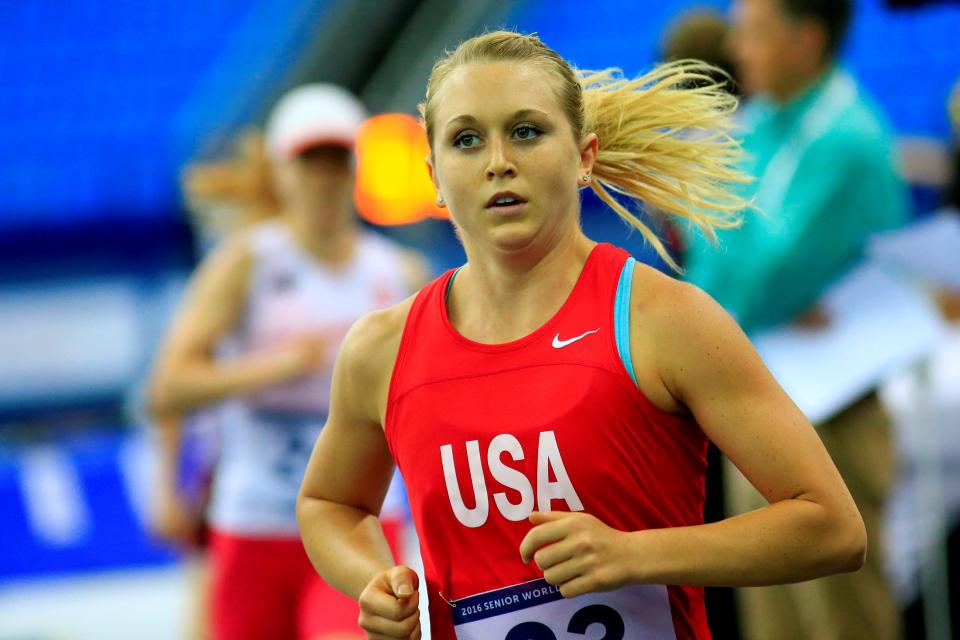
After serving as an alternate for the U.S. modern pentathlon team at the 2016 Rio De Janeiro Olympics, Samantha Achterberg decided she had to make a change.
The stress of not having steady income had made it difficult for her to focus on her training as much as she wanted.
Achterberg estimates that she spent up to $30,000 per year on equipment and domestic and international travel for modern pentathlon, a sport that comprises fencing, freestyle swimming, pistol shooting, cross country running and equestrian show jumping. Qualifying for the Olympics required piling up points at marquee events, and most of those take place in Europe or Asia.
With the USOPC providing little financial help and sponsors only offering equipment instead of money, Achterberg worked multiple jobs and crashed in the basements of friends’ houses in order to scrape by. She further sacrificed sleep to organize a catered party at a swanky home as a fundraiser for herself, but even the $10,000 she made that night only went so far.
“I was like, ‘I can’t keep doing this for another four years,’ ” Achterberg said. “My money in savings was quickly trickling down. I didn’t want to be relying on my parents for support. I loved my sport and I wanted to continue, but at what expense?”
For Achterberg, the solution was enlisting in the U.S. Army in 2017 as part of a program designed to allow soldier-athletes to perform at an international level in their sports while also serving their country in the military. The Army’s World Class Athlete Program pays Achterberg $3,000 per month and covers her travel expenses in return for fulfilling military requirements, leading units through customized skills training sessions and making public appearances.
“Having this has really allowed me to focus so much more on my sport,” Achterberg said. “I’ve seen so much improvement the past two years from not having to worry about working other jobs or trying to figure out where my income was going to come from. They really try to let you train and do your job, which essentially is to win medals, represent them well and be the face of the U.S. Army.”
Achterberg, 28, qualified for the Tokyo Olympics last July by coming from behind to secure a silver medal at the Pan American Games in Lima, Peru. Her Army contract was supposed to expire at the end of December, but now that the Olympics have been postponed, Achterberg will instead reenlist for two more years if she cannot obtain a one-year extension.
“I would not want to go to the Olympics without being part of WCAP and the U.S. Army,” Achterberg said. “They’ve done so much for me.”
The unemployed diver
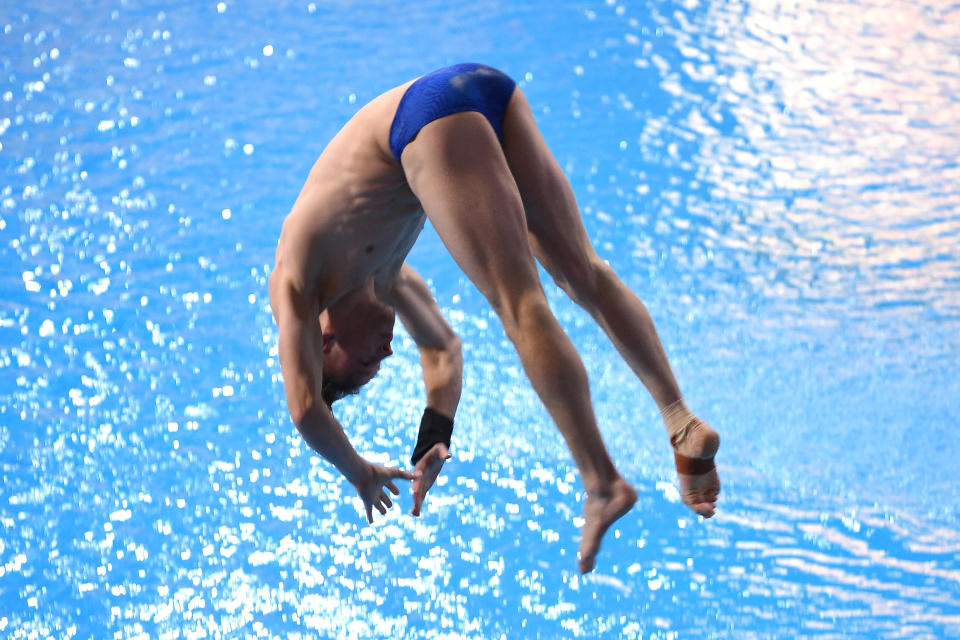
The day after he awoke to text messages about the postponement of the Olympics, Steele Johnson did all he could to replicate normality. He rode his skateboard. He worked out. He read. He watched a movie with family.
When it came time for online job searching, however, replicating normality was impossible.
“Now that the Olympics are postponed, I’ve definitely had to ramp it up,” the 23-year-old diver said. “I’m spending even more time throughout my day searching, for both part-time and full-time.”
Until this month, Johnson had been “solely focused” on training for his second Olympics. He’d dip into savings, and drive for GrubHub, or help his wife photograph weddings, to scrape by. And scraping by for four more months was doable. Full-time employment could wait until after Tokyo.
Then the pandemic hit, and now it can’t. Four months became 16, and consistent work became necessary sustenance for Johnson’s Olympic pursuit.
His silver medal in Rio attracted the attention of potential sponsors. At age 20, he was a rising star. Some companies, he said, reached out to him about possible partnerships. But NCAA rules prevented him from jumping aboard and profiting. When he turned pro three years later, interest from brands had vanished, and with it went most of his diving-related earning potential.
In diving, performance-based income is meager. For Johnson, income from sponsorships is nonexistent. The past year, therefore, has been a “pretty big struggle” financially. Postponement will prolong the struggle until full-time employment brings relief.
The fundraising sailors
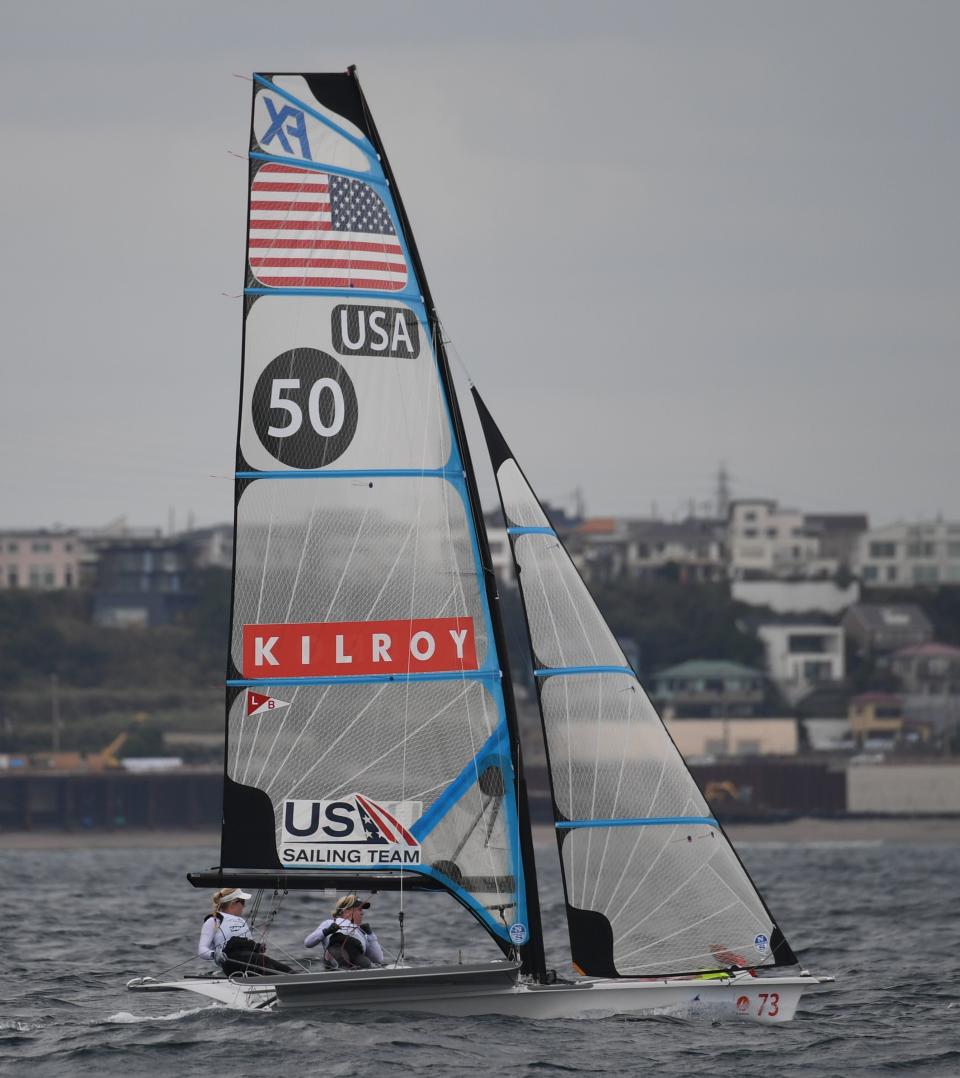
In addition to demonstrating a knack for handling their boats, reading the wind and finding a favorable current, sailors Stephanie Roble and Maggie Shea say there is one other skill that is essential in their sport.
You have to be good at fundraising.
The self-funded American tandem of Roble and Shea spends 250 days per year on the road and 200 days per year on the water. It costs both Roble and Shea more than $100,000 per year apiece to pay their coach an annual salary, to purchase domestic and international flights and hotels and to transport and maintain their high-speed 49erFX class boats.
Those expenses would be implausible for Roble and Shea were it not for the generosity of corporate sponsors and the sailing community. Forty percent of their fundraising comes from Kilroy Realty and other sponsors. The remaining 60 percent is individual donations and grants from yacht clubs and other organizations that support sailing.
“We are constantly emailing and calling individuals to ask them to support us,” Shea said. “Right after we qualified for the Olympics in February, we planned fundraisers for the next few months, most of which have been canceled now. We did a GoFundMe last year. We’ll do one again this year. Fundraising is a really big part of what we do.”
It will never feel normal for Roble and Shea, both 30, to ask strangers for money, but that’s the only way they can pursue their passion. Neither of them fit the sailing stereotype of wealth and privilege.
Shea learned to sail in her grandfather’s boat on Lake Michigan, began racing competitively in high school and college and scraped together a professional career in her early 20s. At one point she worked three jobs — college sailing coach, event management and desk clerk at a periodontist’s office — just to fund her sailing ambitions.
Roble grew up in the small lakeside town of East Troy, Wisconsin, and fell in love with sailing when her parents signed her up for lessons at age 5. Like Shea, Roble worked multiple jobs and hustled nonstop to pave the way for success as a match race skipper and in 49erFX.
“I love the feeling of being on the water,” Roble said. “No day is the same. All of the elements are constantly changing. I really love the challenge of that.”
Roble and Shea secured their spot in the Olympics last month in Australia with a third-place finish in the 49erFX world championships. The postponement of the Olympics means they will both have to fundraise for another year, but the varying water and wind conditions in their sport prepares them well to adapt on the fly.
“We’ve learned to roll with the punches,” Shea said. “For us, this is just another exercise in that.”
The triathlete in limbo
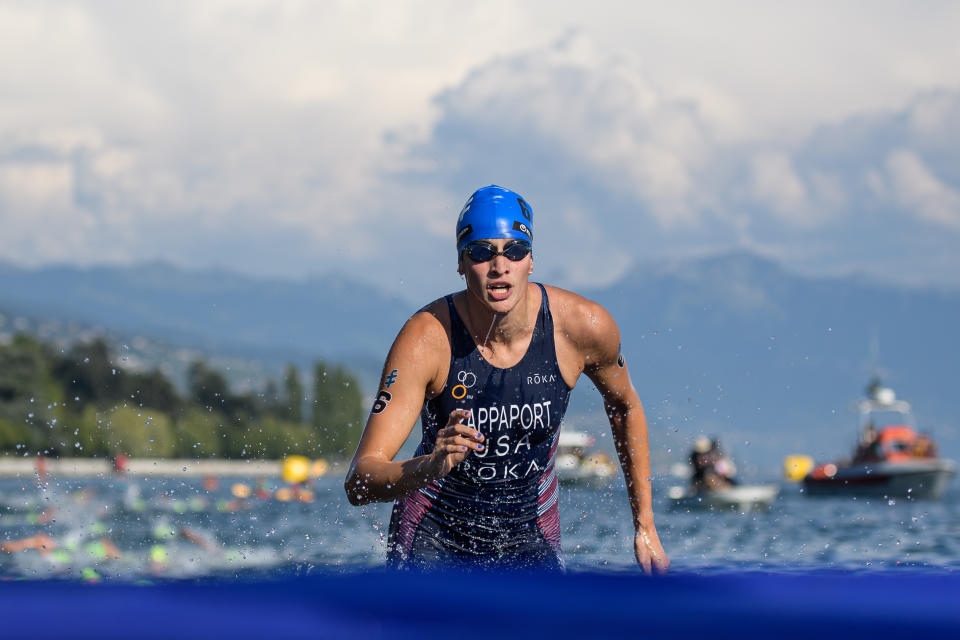
Summer Rappaport had dreamed of being an Olympian since she was 9. The 2000 Games drew her to the swimming pool. Almost two decades later, after a grueling and chaotic triathlon last August, dreams became reality. The 28-year-old marked off July 2020 on her calendar. “My entire focus for 2020 had been performing on July 28,” she said last week.
“And now, to be honest, I don’t know what my focus for 2020 is.”
That, in part, is because the Olympics aren’t the only event to have been postponed. Across 33 Olympic sports, hundreds of races, meets and competitions have been and will be wiped out by COVID-19 and the world’s many countermeasures. For athletes in several sports, including triathlon, prize money from those competitions is their main source of income.
“I’m fortunate to be on USA Triathlon’s national team, so I will have some money coming in,” Rappaport explained. “But it’s a small percentage of my total income for the past few years. So it’s definitely going to be a loss, especially if I can’t race at all this year, which – it could be a possibility. I certainly won’t race until late in the year.”
In normal times, Rappaport would be traveling the world, racing around a dozen times per year, and training 25-30 hours a week, in the water, on a bike, and on her feet. It’s a full-time job. And like so many others throughout the world, it has disappeared. “I don’t know when I’m going to be racing again,” she said. “I don’t know when I’m going to be able to train again.”
And as for that moment she clinched qualification, back in August, the day she ensured fulfillment of her dream?
“It feels like it was a different lifetime.”
The table-waiting canoeist
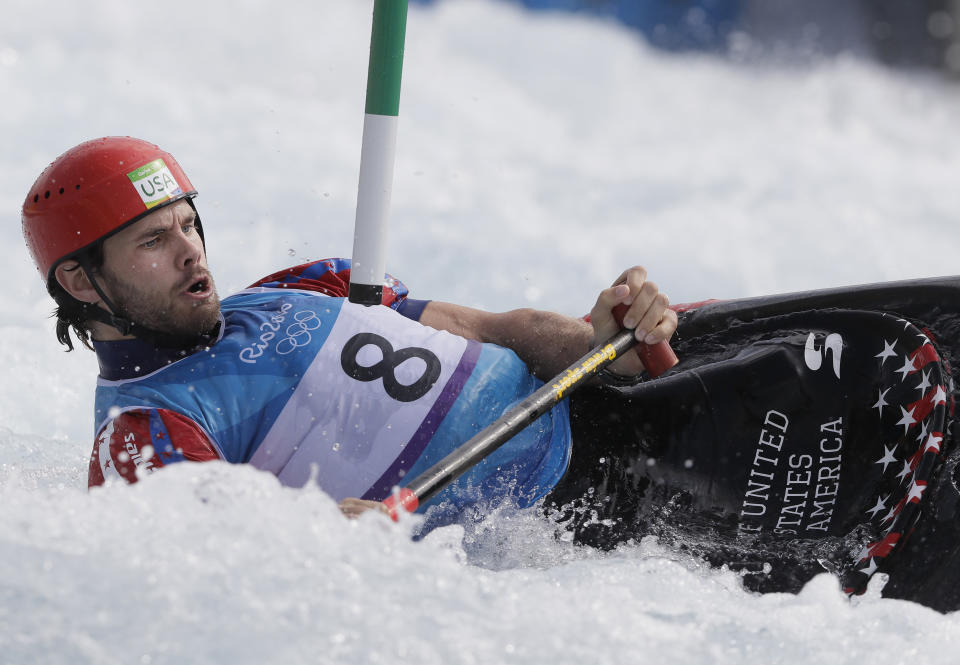
Casey Eichfeld has a very sensible reason for keeping his and wife’s bank accounts separate instead of commingling their money.
“I don’t find it fair for her to be paying for any of my adventures around the world,” said Eichfeld, a slalom canoeist and three-time Olympian.
Eichfeld has raced since age 5 in whitewater slalom events, a niche sport with little financial upside for its athletes. It costs Eichfeld about $30,000 per year to compete internationally, but the lack of visibility of his sport makes it nearly impossible to find corporate sponsors.
The bulk of that sum is travel expenses because Eichfeld spends six months out of every year training or competing internationally. Eichfeld, 30, also must pay hourly fees for whitewater space and to buy or maintain state-of-the-art equipment.
Such a demanding schedule should make it difficult for him to find work, but Eichfeld has been fortunate. The Southern bistro where he works as a server in the Charlotte suburbs lets him return after months on the road and allows him to pick up shifts that fit around his training schedule.
The income that Eichfeld makes at the restaurant typically doesn’t cover his costs, so he also relies on the generosity of friends and family. Those close to Eichfeld will often donate without him asking, which is a huge relief to a man who hates that asking for financial help is an unavoidable drawback of pursuing his calling.
“Some years are tighter than others,” Eichfeld said. “I never have an expectation that people are going to help me, but pretty much every year people come to my aid and make sure I get to the events I need to get to and stay in equipment that is top of the line.”
Eichfeld has competed at every Olympics since 2008 in either single or double canoe. He is hoping to vie for his first Olympic medal in Tokyo next summer.
The coronavirus pandemic has impacted all parts of Eichfeld’s life, canceling his competition schedule, hampering his training and limiting him to just 10 hours a week of helping with to-go orders at the restaurant. That means he’s not spending as much on travel he expected but he also isn’t bringing in as much income.
Like always, Eichfeld will approach everything with a positive attitude.
“If we wanted to get rich, we should have become football players,” he said.
More from Yahoo Sports:



